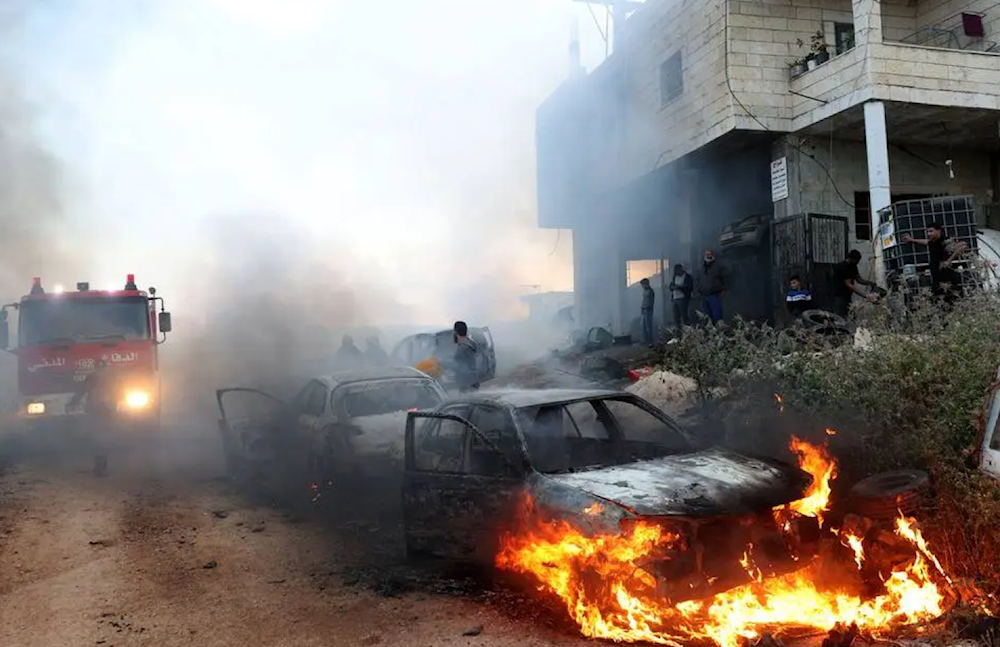Israeli forces attack farmers, destroy olive harvest in West Bank
The IOF have been banning farmers from accessing their properties since the olive harvest began, especially in the eastern parts of the Qalqilya Governorate.
-

A view of damaged houses and burning vehicles after a raid by Israeli settlers on the Mughir town near Ramallah, West Bank, on April 12, 2024. (Anadolu)
Israeli occupation forces (IOF) stormed the town of Kafr Qaddum, east of Qalqilya, on Thursday, attacking farmers and taking their olive crop.
They broke open the sacks carrying the freshly harvested olives and strewn the food throughout the streets, WAFA reported.
Israeli Police Minister Itamar Ben-Gvir pushed Prime Minister Benjamin Netanyahu to call off the West Bank's olive harvest season just before these attacks by the IOF took place.
The IOF have been banning farmers from accessing their properties since the olive harvest began, especially in the eastern parts of the Qalqilya Governorate. They say they need permission from the Civil Administration in advance to reach property that is categorized as "Area C".
Some government officials in "Israel" have long advocated for seizing "Area C" and forcing the local Palestinian population out.
'They want all Palestine': Palestinian farmer laments burnt olive crop
Late last month, Palestinian olive farmer Eid told The Times of Israel that Israeli settlers intentionally set fires that ravaged olive groves around Burin the previous Wednesday, damaging or destroying hundreds of trees.
Eid estimated that around 300 of his 900 olive trees were lost, though he has been unable to assess the full extent of the damage due to fears of attacks by extremist settlers and IOF restrictions on access. In total, he believes approximately one thousand trees were either destroyed or damaged in the attack.
“Wednesday was a big loss. There won’t be any olives this year,” he told The Times of Israel. “We have lost a lot of olives and olive oil this year.”
Due to ongoing Israeli restrictions, which have worsened because of the current war on Gaza, Eid, like many Palestinian farmers, has been unable to access his land for olive cultivation and harvesting for a year and a half. He stressed that he has nearly exhausted his financial resources.
“Where will I get money? What will I do, what will we eat?” he questioned.
As a father of three daughters, Eid expressed despair over finding the funds to enroll his eldest in university, with the registration deadline approaching. “I don’t have one shekel to pay for her university. Where will I get the money from?” he said, after proudly noting her impressive 89 grade point average from high school.
Footage taken on the morning of the fires by a Yesh Din field operative, an organization that monitors settler violence, captured five masked settlers—one with a chainsaw—leaving the olive groves as small fires burned among the trees.
The fires began slowly, but after several hours, large clouds of smoke were rising from the olive groves.
Common occurrences
Eid and other farmers in the Burin area have faced repeated settler attacks on their land from surrounding settlements and outposts. Eid’s situation is further complicated by strict access restrictions imposed by the IOF on Palestinian landowners whose properties are near settlements or illegal outposts.
Eid owns olive groves east of Burin, at the base of the extremist illegal outpost Givat Ronen, and west of Burin, near Yitzhar. Even during normal circumstances, he can only access his land for one or two days a year—once in spring for cultivation and again in autumn for harvest.
The ongoing Israeli war on Gaza has eliminated even that limited access. The IOF did not allow Eid and many Palestinians to access their land for the 2023 harvest or cultivation in the previous spring.
Meanwhile, the fire has dashed any hope Eid and his family might have had. Even for the trees that survived the flames, many of the fruits may have been ruined.
“I just feel sad and depressed. These trees—this is what I do. I work with olives and olive oil,” Eid told The Times of Israel.
He noted that he has endured settler attacks and intimidation for years, saying that each time he attempted to visit his groves, he would quickly face threats from armed settlers.
He blamed extremist settlers and the current Israeli government for worsening his situation, stating, “Bibi, Smotrich, Ben Gvir, ......, they want war the whole time… they want all of Palestine.”

 4 Min Read
4 Min Read








